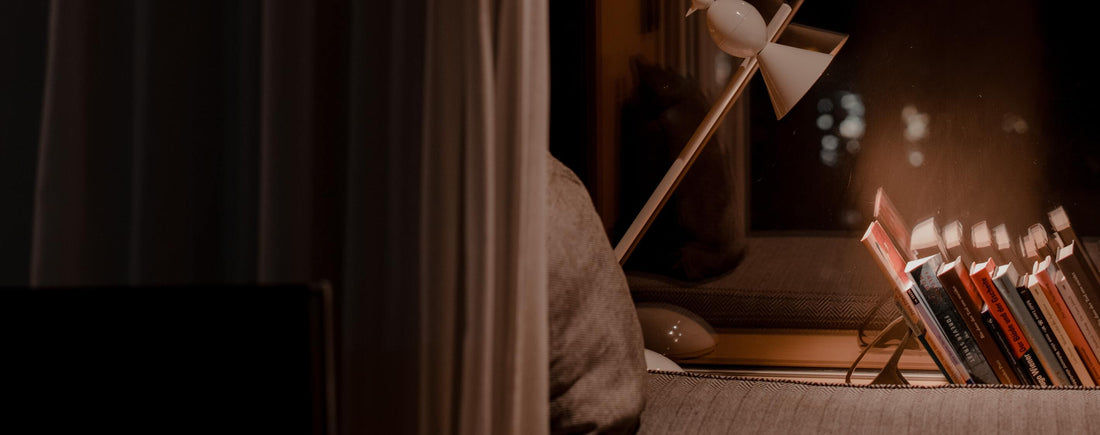Would you like to elevate your health, productivity, and mood? It is not as difficult as you might think. In fact, this task could be as simple as incorporating a few specific habits into your nighttime routine. The way in which you spend your evening hours can significantly influence the quality—and quantity—of your night’s sleep, which in turn has the potential to affect nearly every area of your life.
Ayurveda offers lifestyle tools that prepare the body for deep and revitalizing rest. The following simple practices are powerful methods of aligning your body and mind with the natural flow of intelligent energy within and around you. By regularly integrating these steps into your evening routine, you will unwind, relax, and become receptive to the deeply restorative energy of your resting hours.
If the urge to snack strikes between dinner and bedtime, opt for a cup of herbal tea instead. Unlike evening snacking, a cup of herbal tea can facilitate the release of sleep-inducing hormones without activating the digestive fire (or agni). Chamomile, passionflower, and lemon balm teas have all been shown to promote relaxation and restorative rest.
To set yourself up for maximum productivity the following day, you might try the 100-year-old Ivy Lee method.
While light of any kind can hinder the secretion of melatonin, blue light from electronic devices does so more powerfully. Harvard researchers compared the effects of 6.5 hours of exposure to blue light to exposure to green light of comparable brightness. The blue light suppressed melatonin for about twice as long as the green light and shifted circadian rhythms by twice as much (3 hours vs. 1.5 hours). To synchronize your body with nature’s infinite intelligence, get plenty of sunshine during the day, then turn down the lights and power down devices an hour before bedtime. Use that pre-bedtime hour to read, reflect, meditate, and spend time with loved ones. Taking the time to incorporate relaxing activities before bedtime will help you to de-compress before you fall asleep.
To enhance the soothing properties of water, try adding essential oils. The essential oil lavender, for example, is known to rapidly penetrate into the bloodstream where it delivers its powerful packages of cellular information. Essential oils such as lavender, rose, and sandalwood have been used traditionally in Ayurveda for their relaxation properties.
Take time to inventory your day, pausing to relive your positive moments. Give thanks for the good, letting your heart be permeated with gratitude. On the flip side, acknowledge challenges or conflicts, asking yourself what can be learned from them. Visualize your challenges, including the individuals in them, surrounded in white light. Then let your mind ruminate on the good that can come from the situation.
*Editor’s Note: The information in this article is intended for your educational use only and is not a substitute for professional medical advice, diagnosis, or treatment. Always seek the advice of your physician or other qualified health providers with any questions you may have regarding a medical condition and before undertaking any diet, supplement, fitness, or other health programs.
Ready for relaxation? Discover a curated self-care experience and guided meditations in the Chopra App, available now.
Ayurveda offers lifestyle tools that prepare the body for deep and revitalizing rest. The following simple practices are powerful methods of aligning your body and mind with the natural flow of intelligent energy within and around you. By regularly integrating these steps into your evening routine, you will unwind, relax, and become receptive to the deeply restorative energy of your resting hours.
1. Stop Eating 2–3 Hours Prior to Bed
According to Ayurveda, the Kapha energies of earth and water become increasingly prominent between the hours of 6 p.m. and 10 p.m. These dense energies will naturally slow the digestive process. Eating a large meal within two to three hours of bedtime can keep the body engaged in its “daytime” work of breaking down, assimilating, and disseminating nutrients. When the digestive process is still active, the production of sleep-inducing hormones (such as melatonin and somatotropin) may be delayed or diminished. By completing your evening meal two to three hours prior to bedtime, the body has time to shift from alert mode to rest mode, thus maximizing the repair-and-rejuvenation window.If the urge to snack strikes between dinner and bedtime, opt for a cup of herbal tea instead. Unlike evening snacking, a cup of herbal tea can facilitate the release of sleep-inducing hormones without activating the digestive fire (or agni). Chamomile, passionflower, and lemon balm teas have all been shown to promote relaxation and restorative rest.
2. Prepare for the Next Day
A peaceful morning begins the night before. It is hard to unwind and rest once it’s time to sleep if your mind is brooding over the following morning’s to-do list. With a little preparation, you can allay concerns for tomorrow and set yourself up for a productive, peaceful day. Before turning in for the night, spend a few minutes in preparation for tomorrow.- Set out your clothes.
- Fill up your water bottle.
- Prepare breakfast and lunch.
- Organize your personal space(s).
- Pack up your purse, backpack, or briefcase.
To set yourself up for maximum productivity the following day, you might try the 100-year-old Ivy Lee method.
- Each night, write down the six most important tasks that you need to accomplish the following day. Limit yourself to no more than six.
- Then prioritize those tasks in order of importance.
- When tomorrow arrives, start at the top of your list and get to work completing one task at a time.
3. Shut Down Electronics and Turn Down the Lights an Hour Before Bed
Until the advent of artificial lighting, the sun was the major source of light. People spent their evenings in relative darkness. The body’s circadian rhythm evolved to respond to nature’s cyclical patterns of light and darkness. The sleep-signaling hormone melatonin, for example, is suppressed in the presence of light.While light of any kind can hinder the secretion of melatonin, blue light from electronic devices does so more powerfully. Harvard researchers compared the effects of 6.5 hours of exposure to blue light to exposure to green light of comparable brightness. The blue light suppressed melatonin for about twice as long as the green light and shifted circadian rhythms by twice as much (3 hours vs. 1.5 hours). To synchronize your body with nature’s infinite intelligence, get plenty of sunshine during the day, then turn down the lights and power down devices an hour before bedtime. Use that pre-bedtime hour to read, reflect, meditate, and spend time with loved ones. Taking the time to incorporate relaxing activities before bedtime will help you to de-compress before you fall asleep.
4. Enjoy a Bath or Foot Soak with Essential Oils
Ancient healing traditions have long used water as a means of cleansing the consciousness. From a Hindu’s dip in the holy waters of the Ganges River to a Christian’s baptismal immersion, water is a universal symbol of purification. In Ayurveda, water is one of the five Ayurvedic elements, known to soothe, calm, and settle both body and mind. To take advantage of water’s healing properties, take a warm bath and let it wash away any stress from the day. If there isn’t time in your evening routine for a bath, simply soak your feet in warm water for five to ten minutes.To enhance the soothing properties of water, try adding essential oils. The essential oil lavender, for example, is known to rapidly penetrate into the bloodstream where it delivers its powerful packages of cellular information. Essential oils such as lavender, rose, and sandalwood have been used traditionally in Ayurveda for their relaxation properties.
5. Review Your Day
Whether you realize it or not, you are creating the narrative of your life. Each day provides content for your story. The lens through which you view that content will color your life story in either positive or negative hues. By spending less time reviewing the challenges, problems, and uncertainties of your day and more time reflecting on the beauty, blessings, and serendipities, you will craft an inspiring and uplifting story.Take time to inventory your day, pausing to relive your positive moments. Give thanks for the good, letting your heart be permeated with gratitude. On the flip side, acknowledge challenges or conflicts, asking yourself what can be learned from them. Visualize your challenges, including the individuals in them, surrounded in white light. Then let your mind ruminate on the good that can come from the situation.
6. Repeat a Positive Affirmation
What you think about before you fall asleep influences your subconscious mind. In sleep, the conscious mind becomes secondary and the subconscious mind becomes primary. This is how unexpressed fears, hopes, and fantasies make their way into your dreams. While the subconscious mind can seem a bit elusive, it is actually quite easy to access. The period just before drifting off to sleep and again upon awakening, when the conscious mind is quiet, offers an open door to the subconscious mind. During this time you can change the programing of your subconscious mind by repeating affirmations. Use an affirmation like a mantra, repeating it gently over and over. Allow the gentle repetition to continue as you drift off to sleep. Below are a few affirmations to get you started:- “Nothing can disturb the calm peace of my soul.” –Jiddu Krishnamurti, Indian philosopher
- “I release resistance to what is. I am light and free.”
- “I am full of love, grace, and forgiveness.”
- “I radiate love, kindness, and compassion to all those who cross my path.”
- “I accept with calm impartiality whatever comes my way. Free in my heart, I am not conditioned by any outward circumstance.” –Paramahansa Yogananda, Indian yogi
*Editor’s Note: The information in this article is intended for your educational use only and is not a substitute for professional medical advice, diagnosis, or treatment. Always seek the advice of your physician or other qualified health providers with any questions you may have regarding a medical condition and before undertaking any diet, supplement, fitness, or other health programs.
Ready for relaxation? Discover a curated self-care experience and guided meditations in the Chopra App, available now.






















